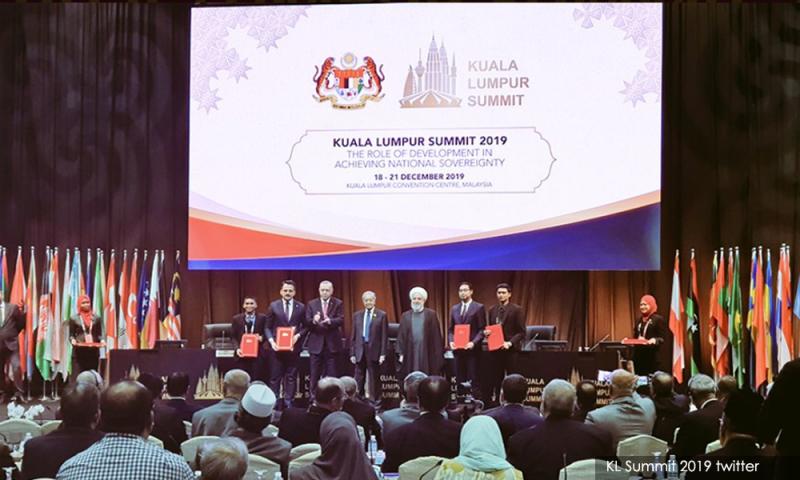Yoursay: Dr M’s Muslim trade pact not grounded in reality
YOURSAY | ‘Mahathir's religion-based nationalism in economic matters is as outdated as...’
Dr M proposes Muslim trade market to overcome reliance on non-Muslim countries
Gerard Lourdesamy: Prime Minister Dr Mahathir Mohamad is lamenting that Muslim countries are not developed and remained poor due to mismanagement and corruption. He is proposing some kind of trading union within the Muslim world.
However, Mahathir's religion-based nationalism in economic matters is as outdated as his mistrust of the West and China. Sadly, in many respects, his ideas are ancient and unworkable.
While Muslims make up 1.7 billion people of the world’s population, more than two-thirds of them live in developing or poor, underdeveloped countries. Their markets are small and their purchasing power is limited.
The Gulf Arab states are an exception but their primary export is still oil or oil-based products.
The rest of the Muslim countries are still commodity exporters and not major producers of manufactured goods or services. Therefore, their capacity to trade is limited.
If tariffs are abolished completely, their own indigenous producers and farmers will be affected because their less developed markets will be overrun by cheap products and produce from the more developed middle to high-income Muslim countries. The end result would be more poverty in these already impoverished countries.
Another negative aspect is the limited capacity of most Muslim countries to invest and transfer technology to the poorer Muslim nations.
Given that the majority of Muslim countries are politically, economically and militarily dependent on the West, the latter will continue to exercise leverage over the vast majority of Muslim nations.
The more advanced Gulf Muslim countries do not have the capacity or capability to fill in any void left by a boycott of the West because their economies and markets are small compared to US, China, EU and Japan.
Lastly, the Gulf Arabs are by nature very shrewd. They are not going to spend their hard-earned petrol dollars on the poorer Muslim countries in Africa and Asia who suffer from endemic corruption and economic mismanagement.
David Dass: I am not sure how realistic Mahathir’s proposal is. Of the top 20 economies of the world, Turkey, Saudi Arabia and Indonesia are Muslim countries.
Turkey relies on aid from the US and from Nato countries. Saudi Arabia relies on US and Europe for its defence, while Indonesia is aligned to US.
Meanwhile, all Asean countries are heavily dependent on China and Taiwan for trade.
The US dollar is still the main currency for international trade and they are still the most powerful country in the world, militarily and economically. This is followed by China, Japan, Britain, Germany, France and India.
It would be wise for any country who wants to diversify their economies by trading with those nations. Mahathir’s idea of a trade bloc to reduce their dependence on non-Muslim nations, and to be immune from US-led sanctions, is not realistic or practical.
Vgeorgemy: Mahathir’s call for Muslim trade market is not grounded in reality. Oil-producing countries in the Middle East are located on barren desert land.
They have to rely on non-Muslim countries for daily food, other necessities and also the market for their oil.
If they had waited for Muslim countries to develop and buy their oil, they would have perished a long time back.
Iphonezours: Indeed, in reality, Malaysia’s biggest trade partners are China, Singapore, US and EU. What economic powers do the Muslim countries hold?
If Muslim nations want to develop economically, they should not mix religion with education, governance and rule of law to everyday life.
Mahathir, we in Malaysia have to get our house in order first before we can suggest anything to the world.
Solo: This is Mahathir’s version of the New Economic Policy (NEP) for the Muslim world.
Instead of competing with the smartest and brightest, Muslims will pay an extra premium for inefficiency, corruption and ineptitude.
Crude oil today is US$60 a barrel but Malaysia will sell it for US$90 as a halal product to Muslims. I wonder if we will get many or any buyers at all.
Kawak: Well, Mahathir, in that case, stop selling our palm oil to India and China which are not Muslim countries.
That way, Malaysia will trade only with Muslim countries. At home, do the same thing. Make the Muslim business community trade only among themselves.
Pharaoh: Imagine if a few "Christian" countries came together and held a summit just like this.
Imagine they announced that they will trade among themselves to lessen their reliance on “non-Christian" countries.
I wonder what the reaction would be.
Hibiscus: Malaysia is struggling to compete with the rest of the world in trade, struggling to attract foreign investments, struggling to attract new markets for its produce.
Yet Mahathir is saying things that are damaging efforts by the country to achieve a better trade scenario. It is better for the country if he resigns now before he does further damage.
Clever Voter: Mahathir is still very much behind developments and is in denial of the present geopolitics. The more affluent Muslims from Middle East love the Western lifestyle.
Brands such as Chanel, YSL, Gucci, Rolex, etc, go along with the Ferraris and Lamborghinis owned by Mahathir’s Muslims “brothers” in the oil-rich countries.
Asking them to boycott these luxuries will only upset them.
The above is a selection of comments posted by Malaysiakini subscribers. Only paying subscribers can post comments. In the past one year, Malaysiakinians have posted over 100,000 comments. Join the Malaysiakini community and help set the news agenda. Subscribe now.
These comments are compiled to reflect the views of Malaysiakini subscribers on matters of public interest. Malaysiakini does not intend to represent these views as fact.
RM12.50 / month
- Unlimited access to award-winning journalism
- Comment and share your opinions on all our articles
- Gift interesting stories to your friends
- Tax deductable
